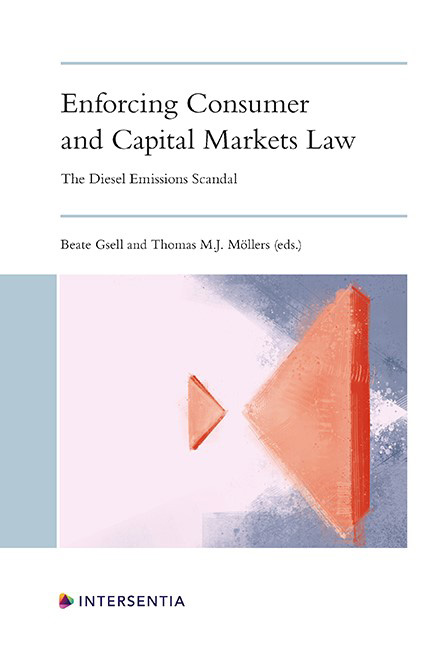Book contents
- Frontmatter
- Acknowledgement
- Contents
- List of Cases
- List of Abbreviations
- List of Contributors
- PART I INTRODUCTION
- PART II EUROPE
- PART II BEYOND EUROPE
- PART III THE SUPRANATIONAL PERSPECTIVE
- PART IV LEGAL PRACTICE PERSPECTIVE
- PART V INTRADISCIPLINARY ANALYSIS AND REFORM RECOMMENDATIONS
- Key Source Bibliography
- Index
- About the Editors
Enforcing Consumer Law in China
Published online by Cambridge University Press: 22 December 2020
- Frontmatter
- Acknowledgement
- Contents
- List of Cases
- List of Abbreviations
- List of Contributors
- PART I INTRODUCTION
- PART II EUROPE
- PART II BEYOND EUROPE
- PART III THE SUPRANATIONAL PERSPECTIVE
- PART IV LEGAL PRACTICE PERSPECTIVE
- PART V INTRADISCIPLINARY ANALYSIS AND REFORM RECOMMENDATIONS
- Key Source Bibliography
- Index
- About the Editors
Summary
In the 2015 VW scandal, the consumer's interest was damaged by VW’s manipulation of results in laboratory emission tests. The Volkswagen Group has paid a great price for the relevant litigations, recalls and compensations. Based on the VW case and the reference Case 1, from the perspective of Chinese law, this chapter will analyse the types of possible remedies for Chinese consumers when facing similar situations. Consumers could seek remedy through either private or public enforcement of law. This chapter focuses on the possible ways to achieve such remedies.
THE VOLKSWAGEN EMISSIONS SCANDAL's INFLUENCE ON THE CHINESE MARKET
The Volkswagen emissions scandal, in which the automobile manufacturer manipulated the laboratory test result of its automobiles’ emissions, was exposed on 18 September 2015. This scandal has also dragged VW into a series of criminal investigations and civil lawsuits in many countries. Germany, Italy, the US and Australia have initiated investigations against the Volkswagen Group and its products.
This incident has drawn intense attention from many countries. However, China, as VW's largest market around the globe, has not shown great concern over this scandal.
According to the manufacture record and sales record of both SAIC Volkswagen and FAW-Volkswagen, none of the VW products manufactured or sold under joint venture between VW and the Chinese local company has been involved in the VW emissions sandal. The only type of product that may face impact from such scandal is the Tiguan with four-cylinder diesel engine. A total of 1.946 of this type of automobile was imported by Volkswagen China. Thus, the manager of public relations and sales department (SAIC Volkswagen) claimed that the automobiles related to the VW scandal were not manufactured and would not be manufactured in China. More precisely, China has banned the manufacture of such types of automobile. Because of that, even if VW is deeply tangled in the scandal, it would not influence VW products’ manufacture or sales in China. Some scholars considered a common view among Chinese public to be the major reason that obstructs the sales of diesel engine car in China: old-styled diesel engine cars had existed in China for a relatively long period in the past and had created an impression among general public that diesel cars are too noisy and produce too much pollution.
- Type
- Chapter
- Information
- Enforcing Consumer and Capital Markets LawThe Diesel Emissions Scandal, pp. 315 - 338Publisher: IntersentiaPrint publication year: 2020

